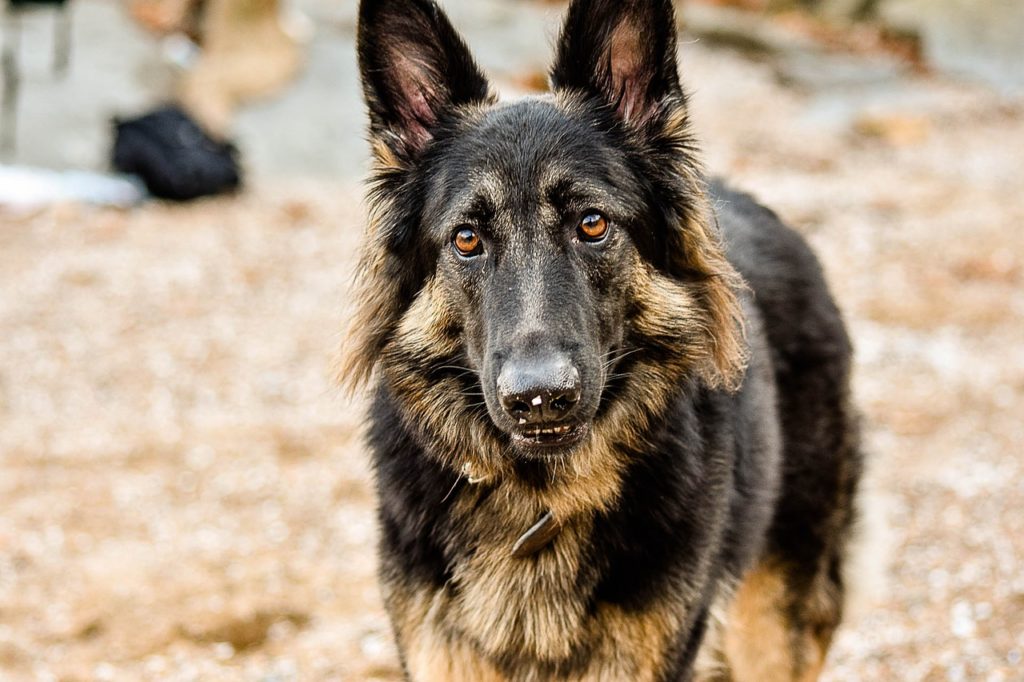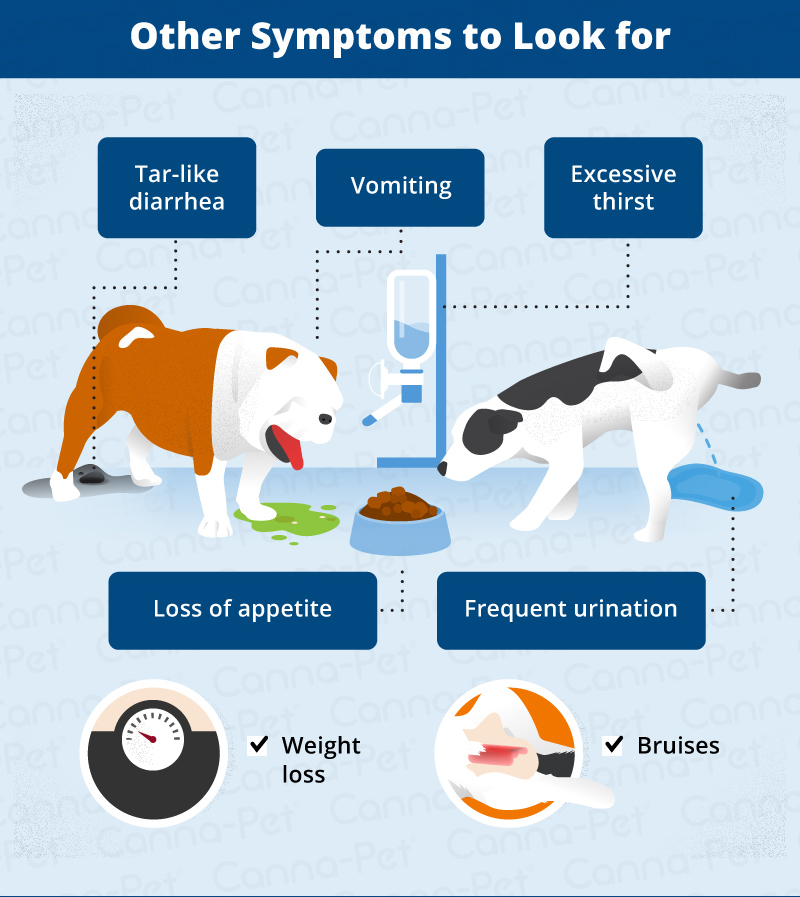Picking up, or examining, your dog’s poop is likely not your favorite thing about being a pet parent. It’s stinky, it’s sticky, and it can make a big mess! But did you know that dog poop is actually a very good window into your pup’s health? How it looks, feels, and smells is generally a great indication of everything working properly – or not. While it’s not always a red flag if your dog’s poop is a weird color, it very well might be.
Because of this, it’s important to look at what healthy dog poop looks like, and things to watch out for. One of those is black dog poop. If your dog’s poop is black, it might be because he has blood in his stool, an often serious case. But before jumping into too much detail about what to do if your dog’s poop is black, you should look at the history of poop, if you will, then examine possible factors. Talking about poop might not be the most fun dog topic, but it’s an important one.
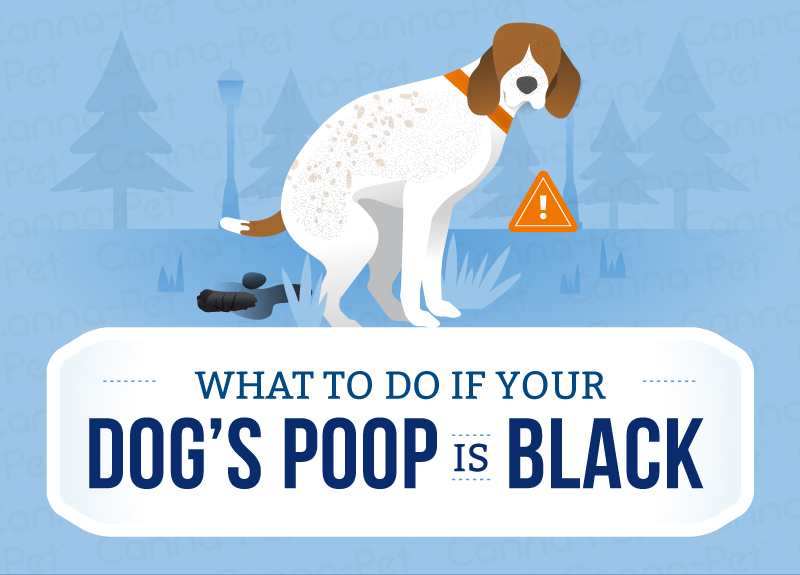
A History of Poop
Before we go into detail about abnormal poop, let’s talk a little bit about healthy poop.Healthy poop can be described using most of the five senses, including sight and smell. Here is a list of what to look for in healthy poop:
- Shape – Dog poop should actually be a similar shape to healthy human poop (depending on the size of the dog). This means that it should come out in long, healthy logs and not be too lumpy, too runny, or too crumbly. If you notice that your dog’s poop comes out in little circle droppings, it may be a sign of dehydration. If you see that your dog has runny poop, this is likely diarrhea.
- Smell – Again, like humans, dog poop should be pretty smelly, but not overly so. This is an aftereffect of a healthy digestive system.
- Color – A rich, chocolate brown – this is the color of healthy dog poop. Anything else, such as black dog poop, should be examined further.
- Amount – The amount that your dog poops should correspond with how much he eats. Too much poop might mean that he has too much fiber in his diet, while not enough poop might be a sign that he’s constipated.
- Contents – Your dog’s poop should be made up of what he last ate. If you notice mucus, parasites, or anything else abnormal in your dog’s poop contents, talk to your vet immediately. This is likely a sign of an underlying health issue.
- Consistency – It should be easy to pick up your dog’s poop, but it should still be a little squishy (like Play-Do) in your hand.
Healthy poop means that your dog’s stomach is happy and everything is being digested properly. But what should you do if your dog’s poop is black?
Reasons Why Your Dog’s Poop is Black
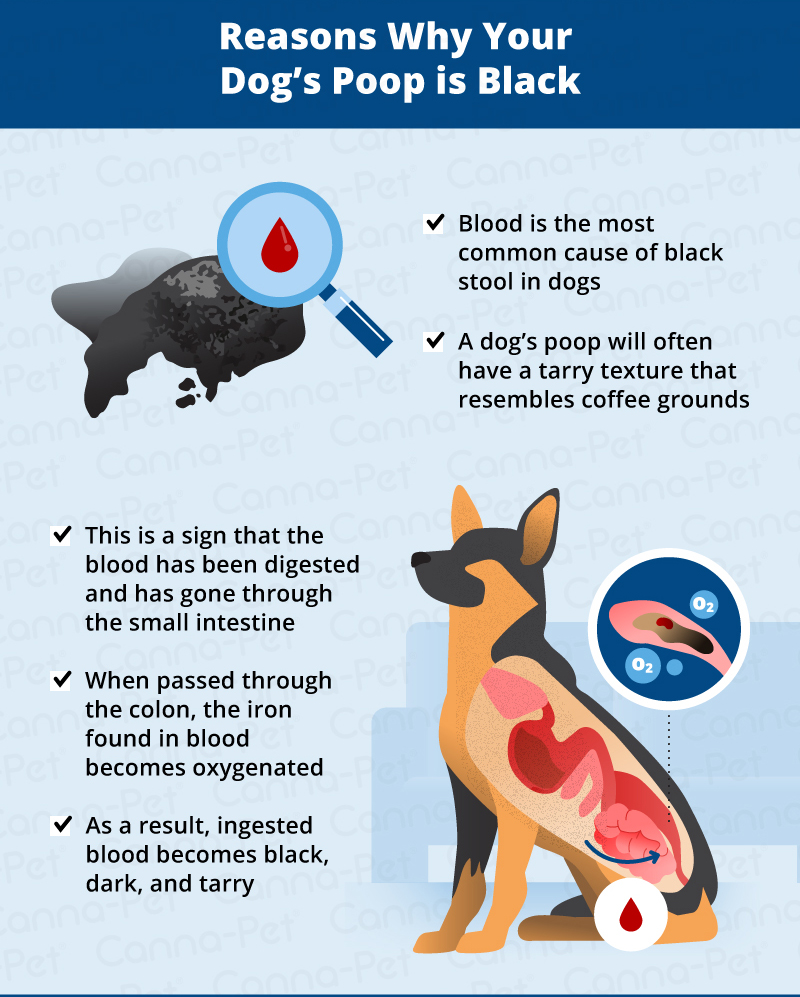
There can be multiple reasons why your dog’s poop is black, but the most common is that he has blood in his stool. This can also cause his poop to be a tarry texture, which may look similar to diarrhea. But you might be thinking, “if my dog had blood in his stool, wouldn’t it be red?” Yes and no, it depends on the scenario. Sometimes, bright red poop or poop with just a little bit of blood is nothing to be concerned about. It could just be a simple upset stomach. But dark, tarry stools, on the other hand, are likely a sign of something more serious. This usually means that not only is the blood in the stool, but it has also been digested and made its way to the small intestine.
Blood has iron, which, when exposed to air, turns the red we associate with blood. But when it is digested, like in the case of black dog poop, the iron is oxygenated when it passes through the colon and the end result is black, dark, tarry stool. There are many reasons why your dog might have blood in his digestive system and poop, so it’s important to talk to your vet right away if you notice this happening. Like most medical conditions, the earlier you treat the underlying issue, the better chance of recovery. Below are some of the most common reasons why your dog might have black poop:
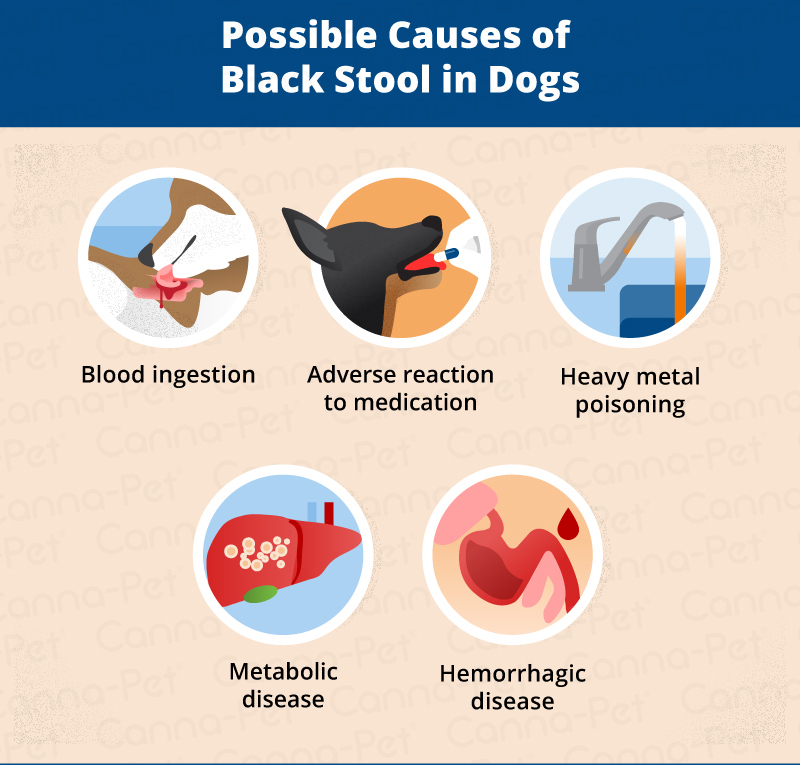
Blood Ingestion
Blood can also be seen in dog poop if a dog has ingested a significant amount of blood, such as from a nosebleed, vomiting blood and then eating it, and coughing up and swallowing blood. This is different from the intestinal bleeding discussed earlier and still something you should consult your vet about.
Adverse Reaction to a Medication
A less common, but still viable reason for black poop and blood in your dog’s poop could be because of a bad reaction to a medication. Some medications may cause internal bleeding in extreme cases.
Heavy Metal Poisoning
At this point, we all know the dangers of heavy metals like arsenic and lead, but did you know that these metals are still used in some everyday items? Because of this, your dog can ingest these metals and experience symptoms like neurological and gastrointestinal issues. Other symptoms of heavy metal poisoning include seizures, confusion and running in circles, blindness, and major changes in behavior. If you suspect that your dog has heavy metal poisoning, take him to the vet immediately.
Metabolic Disease
Black dog poop may be a sign of either hypothyroidism or hyperadrenocorticism. Hypothyroidism is when dogs have low thyroid levels, which causes them to be sluggish and have a slowed down metabolism. Hyperadrenocorticism involve abnormal production of cortisol, which is responsible for metabolism regulation. When your dog’s metabolism is off, his poop might be off too. Luckily, metabolic diseases are relatively common and might be easily diagnosed using a normal blood test. But, these conditions can be more extensive so always visit your vet for a professional opinion.
Hemorrhagic Disease
Hemorrhagic gastroenteritis (HGE) is an intestinal problem that exhibits symptoms such as bloody diarrhea and vomiting. But, it’s important to note that with HGE, the stools will be bright red, rather than the dark black of the other conditions listed above. This is still something to look out for, but is different than black dog poop.
All of the above conditions are serious and one of the symptoms is bloody stools or black poop. In addition to having black, tar-like poop, there are other symptoms to look out for if you believe your dog has any of the above conditions. These symptoms include:
- Tar-like diarrhea
- Vomiting (including vomiting blood)
- Bruises
- Loss of appetite
- Excessive thirst
- Frequent urination
- Weight loss
Diagnosis
Getting help for your pup if he has a serious condition is key. So what should you expect when going to the vet for a diagnosis?
First, your vet will take the basics on your dog, including temperature, blood pressure, and heart rate. Before you go to the vet, gather all applicable medical history because anything might be helpful during this time. Your vet will want to know any medications your dog is on, his past health issues (if any) and any other pertinent information. Also, make sure to include any recent diet changes or behavioral changes that you have noticed, as this can be a symptom, as well.
All of the different tests available to vets will help determine the cause of your dog’s bloody stools. Because there are so many options, these tests may include testing blood count, a urinalysis, a fecal examination, chest X-Rays, and possibly endoscopy.
After a diagnosis is confirmed, your vet will prescribe a very specific treatment plan to help you get your dog as healthy as possible. These changes may include:
- Plenty of rest to help your pup heal
- Prescription medicine. If your vet prescribes any meds, make sure to give them to your dog exactly as described and finish all the medication, no matter how your dog seems to be feeling.
- Antibiotics
- Special diets
- No people food!
- Veterinarian follow-up
If the case is extreme, though, your dog may have to undergo a blood transfusion, IV fluid therapy, and 24-hour observation.
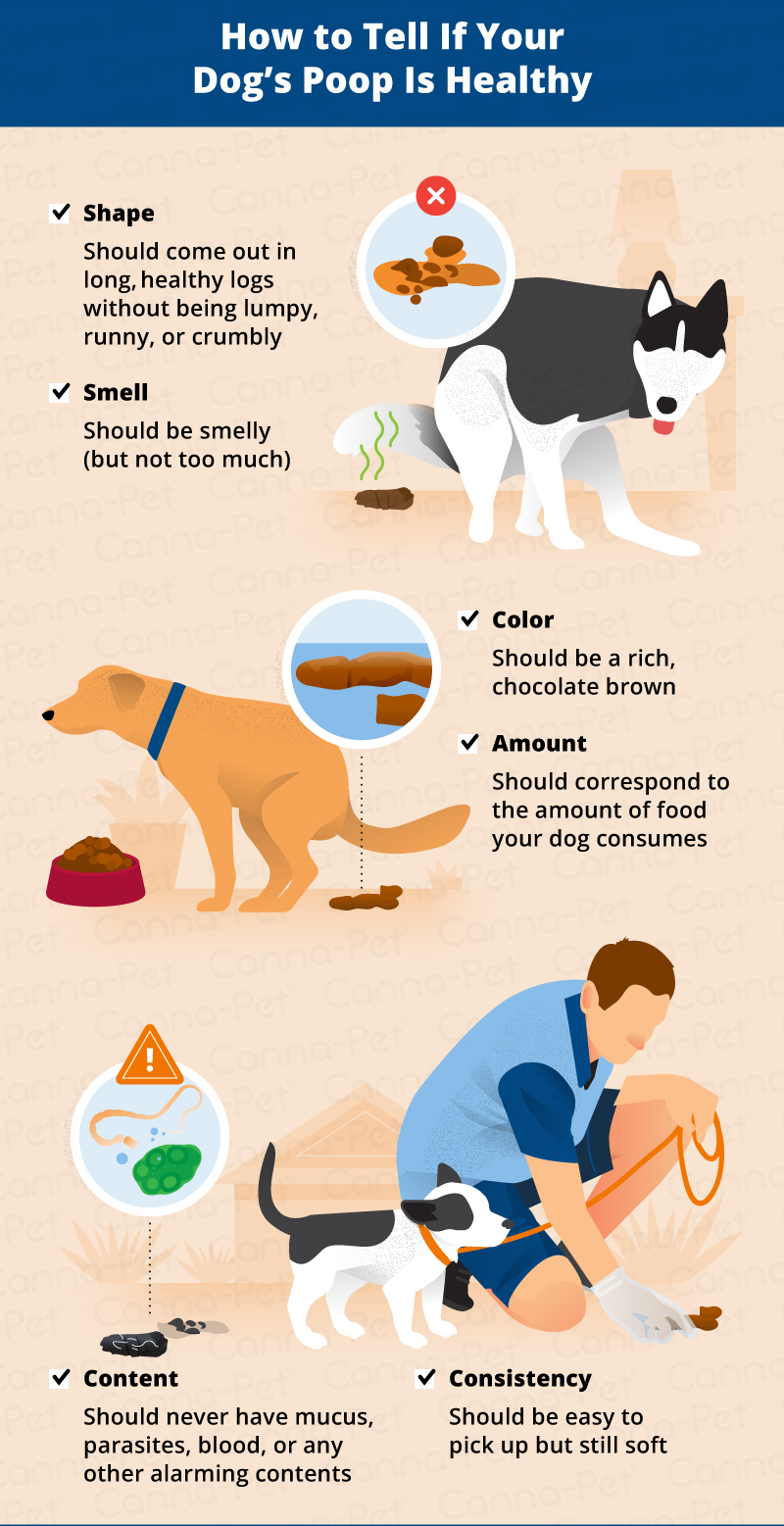
Conclusion
Black dog poop is usually a very serious issue as the underlying cause could be a disease or another serious problem. To conclude:
- Healthy dog poop is brown, squishy, a consistent texture, and made up of contents that your dog ate (not blood, mucus, or another substance)
- There can be multiple reasons why your dog’s poop is black, but the most common is that he has blood in his stool and gastrointestinal bleeding.
- When blood is digested, like in the case of black dog poop, the iron is oxygenated when it passes through the colon and the end result is black, dark, tarry stool.
- If your dog has ingested blood and pooped it out, chances are that it could have come from his lungs, esophagus, stomach, or small intestine. These are also all likely places for a tumor.
- Blood can also be seen in dog poop if a dog has ingested a significant amount, such as from a nosebleed, vomiting blood and then eating it, and coughing up and swallowing blood.
- A less common, but still viable reason for black poop and blood in your dog’s poop could be because of a bad reaction to a medication.
- Heavy metal poisoning can cause neurological and gastrointestinal issues.
- Black dog poop may be a sign of either hypothyroidism or hyperadrenocorticism, which are metabolic disorders.
- Hemorrhagic gastroenteritis (HGE) is an intestinal problem that exhibits symptoms such as bloody diarrhea and vomiting.
- When getting help from the vet for gastrointestinal bleeding and black stools, you can expect them to take the dog’s vitals and recommend an appropriate course of action depending on the issue.
As gross as it sounds, dog poop is actually a very good window into your dog’s general health. If you notice that your dog’s poop is black, tar-like, and has blood in it, contact your vet immediately. As a pet parent, it’s your job to be attentive and proactive to your pup’s health and this could be a serious concern.
Sources:
- “Black, Tarry Feces Due to Presence of Blood in Dogs.” PetMD, Accessed 21 Dec. 2017. https://www.petmd.com/dog/conditions/digestive/c_dg_melena
- “What Are the Causes of Black Dog Poop?” Dogster, Aug. 2018, Accessed 21 Dec. 2017. https://www.dogster.com/dog-health-care/black-dog-poop
- “7 Pet Symptoms You Should Not Ignore.” Dogtime, Accessed 21 Dec. 2017. https://dogtime.com/dog-health/general/2481-dog-symptoms-serious-ernie-ward
- Naviglia, Nicole. “What Does Dog Poop Color Mean?” Canine Journal, 7 June 2017, Accessed 21 Dec. 2017. https://www.caninejournal.com/dog-poop-color/
- Turner, Callum, “ Tarry Feces Due To Presence of Blood In Dogs.” Accessed 21 Dec. 2017. https://wagwalking.com/condition/tarry-feces-due-to-presence-of-blood

